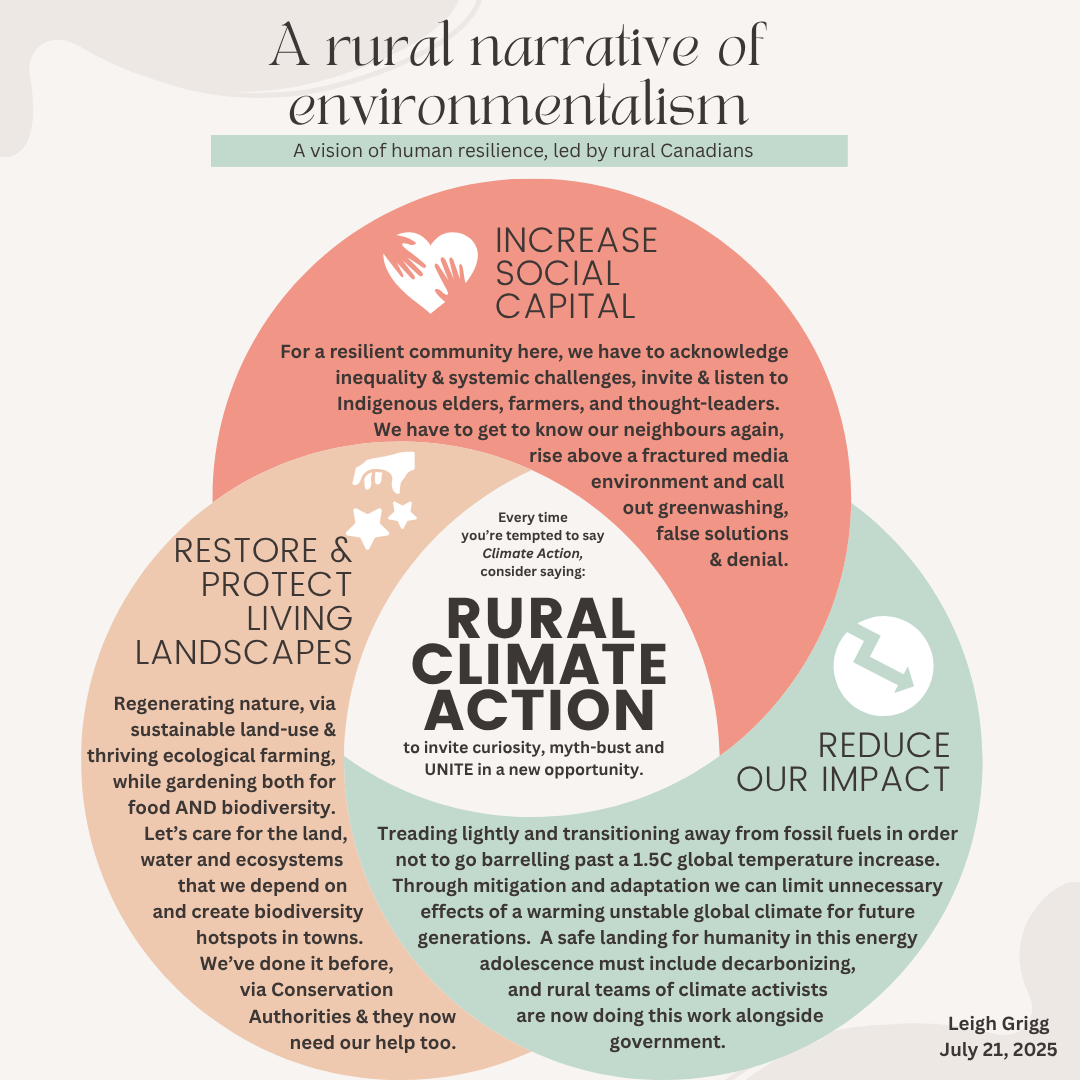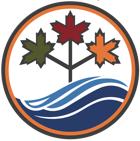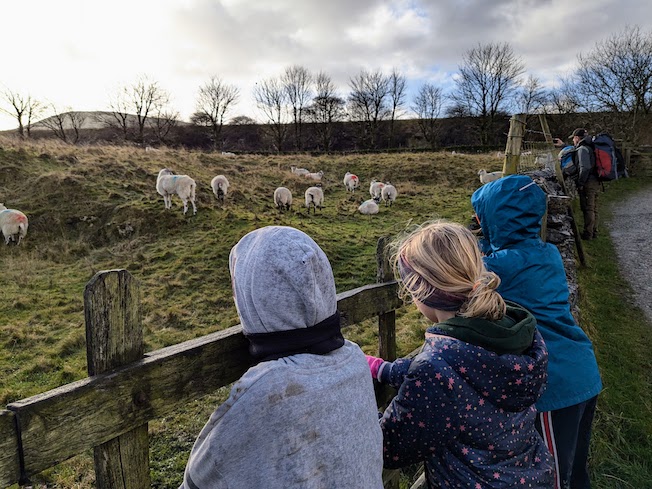A Case for RURAL Climate Action
Contributed by: Leigh Grigg, Treasurer
This is my own modus operandi right now.
It doesn't have to be yours, and it doesn't have to be ours either, but I should share it:
- Every time you are tempted to say Climate Action, say Rural Climate Action instead. Let's invite curiosity (as to what distinguishes rural climate solutions from popular climate solutions... ie. what gives us agency) while embracing our roots in mainly rural Grey-Bruce, in an attempt to unite ruralites. see next point:
- Improve social capital. Invite & listen to Indigenous Elders, co-create with community leaders, acknowledge inequality, but also return that endearing rural mentality of looking out for your neighbours and considering their wellbeing.
- Commit to the Doughnut. Undertake actions that have broad impact, co-benefits and balance human & planetary needs. Multisolving brings people and groups together.
- Be a myth-buster by relying on experts in their field, and those who have their ear to the ground. Call out false solutions, solutions that come at the expense of other human health/needs, and greenwashing.
- Tread lightly yourself. Lower your impact on earth, air, and people, and not be afraid to pivot actions or projects based on new learning, science, & listening.
If anyone wants to help me take this "rural climate action" space and "run with it" across Canada, it's current shape is something along the lines of:

There is much subjectivity here: each viewer brings their own experiences, emotions, and perspectives to the diagram above. Interpretations can vary widely, and of course a viewer's cultural background can significantly affect how they interpret it too, so the aim is to put it here as mine, and then (like the very first line says) listen to others. Please tell me what you like and don't like about this compass-setting, and whether it excludes anything or anyone vital to creating a brighter future... my email address is at the bottom.
When looking at the above, I mainly see our ecosystem of local environmental groups who make a number of civic contributions here in our region.
Initially, I saw Red Sphere: Social Justice Groups Orange: Climate Adaptation Green: Climate Mitigation
Then, I spotted Red Sphere: who is affected by my actions Orange: what is affected by my actions Green: where are the effects of my actions
Then, for some reason I thought about Red Sphere: Look at the people around me for answers Orange: Look down at the soil for answers Green: Look up at my emissions for answers
Finally, I had a good think and saw it differently again:
- Red Sphere: local issues requiring many small thoughtful actions, I have high agency. I'm going to act every day.
- Orange: regional issues requiring groups & citizen-led collaborations, I have modest agency. I'm going to do something impactful when I can.
- Green: global issues requiring governments, nations, and many unknowns, I have low agency. I'm going learn more, and in the meantime support others.
So, this Venn Diagram above is above all else, a "nod" to groups doing great work in this complex system of advocacy and on-the-ground projects. They are, but not limited to:
Escarpment Corridor Alliance, Bagida'waad Alliance, M'Wikwedong Indigenous Friendship Centre, Grey Ag Services, Saugeen Conservation, GSCA, Safe & Sound, The Blue Mountains Sustainability Dept, Public Health Grey Bruce, Silver Creek Watershed Group, Canadian Museum of Water, Clearview Sustainability Network, Niagara Escarpment Biosphere Network, Bruce Trail Clubs, Protect our Winters, Tree Trust Town of Blue Mountains, CORCC mountain biking group in Collingwood, Thornbury Lions Club, Georgian Bay Forever, GBCAN, Climate Action Now Network, Collingwood Climate Action Team, Georgian Bluffs CAT, Grey Highland CAG, Transition Meaford, Bruce Peninsula Environment Group, Beaver Valley Outreach, Collingwood Nature League, Kolapore Wilderness Trail Assoc, Beaver Valley Destination Stewardship, Oshare, Green Drinks Midland, Bruce Botanical Food Gardens, Natural Burial Association, Rural Rootz, SauGREEN for the Environment, Owen Sound Waste Watchers, Pollinate Owen Sound, Elephant Thoughts, Persephone Market Garden, Lake Huron Forever, National Farmers Union - Grey, Lake Huron Coastal Centre, Rankin Resource Group, Glassworks Co-op, various Repair Cafe's, Great Lakes Great Responsibility, Bruce Grey Woodlands Assoc, Green Goderich, Saugeen Nature, John Butler's The Village Green newsletter, Marsh St Centre, Environment Network, Blue Mountains Watersheds Trust, Owen Sound Water Watchers, Bruce Community Futures, Sources of Knowledge Forum, Saugeen Shores ESAC, Golden Town Outreach, CMHA Food Gardens, Saugeen Trading Community, Ecological Farmers Association of Ontario, NeighbourWOODS North, Pine River Watersheds Initiative Network, Inglis Falls Arboretum Alliance, Healthy Lake Huron, Bruce Peninsula Biosphere Association, Owen Sound Field Naturalists, Nature Conservancy of Canada, Penetangore Watershed Group, Plover Lovers, Ontario Land Trust Alliance, Saugeen Ojibway Environment Office, Beaver Valley Watershed initiative, Walkerton Clean Water Centre, Georgian Bay Forever, Alternative Land Use Services (ALUS) Grey Bruce Poverty Task Force, Stewardship Grey Bruce, Grown in Grey, Grey Assoc for Better Planning, Grey Bruce Centre for Agroecology, Community Foundations Grey Bruce, Bluewater Outdoor Education Centre, Eden in Season, Fiddlehead Nursery, Bruce Peninsula Bird Observatory, Owen Sound Water Watchers, Escarpment Biosphere Conservancy, Youth Climate Action Conference, Ducks Unlimited, Historic Saugeen Metis, Watersheds Canada, Kincardine Residents against Phragmites, Huron Fringe Field Naturalists, GreenFeet Ecosystems, Bluewater Education Foundation, who are all active in our area. And props to Grey County for the work on Going Green in Grey and the upcoming Climate Adaptation Plan, both shaped with local context and collaboration with groups such as ours. The Venn diagram above is obviously also an invitation to cross-pollinate, and I am also happy to listen to your prior efforts to unite local eco-groups.
PS. need this list on a map? TSP has that too, amidst all the ecological farms, food banks, trail associations, independant journalism, community gardens, "friends of" groups such as Friends of Kimberley Forest, forest schools, refilleries, and green builders we could find, just click here.
Moving forward, how?
Can you imagine if we united in the face of urban sprawl or some other development challenge, or anything that treats our biodiverse landscapes as collateral damage?
- Would your group like to perhaps offer our collective support Ontario Nature's campaign against Bill 5, prioritizing protection of living landscapes, or one of the other leading organizations in the spheres above?
- Would your group like to co-create (considering general climate justice issues) a show of support from settler culture to the Indigenous groups still fighting for a repeal of Bill 5?
- Would your group like to perhaps contribute to taking out a full page newspaper/magazine ad?
- Would your group like to meet up at the next ECA networking event?
- Would you like to help us reboot the Regional Environment Group, whose 2nd meeting was sadly canceled in April 2020 due to the pandemic.
- ONE THING'S FOR SURE: You can come chat with us at the upcoming AGM / Inspiration Session on the morning of August 28th at Grey Roots Museum.
Leigh Grigg
The Sustainability Project
scaleupprojects@gmail.com

